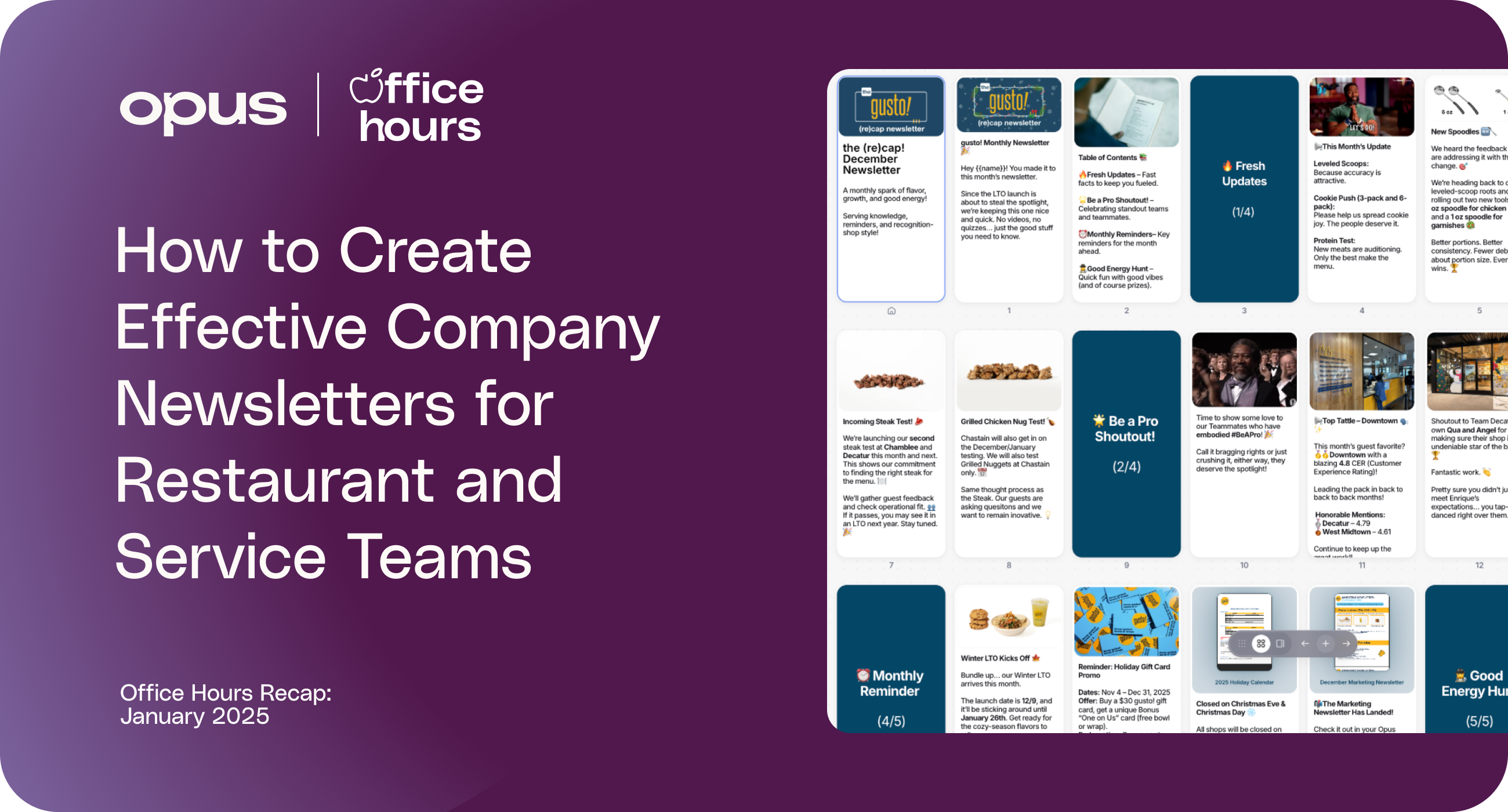In this panel discussion, industry leaders Luke Holden, CEO and founder of Luke's Lobster, and Lori Goldstrohm, VP of training at Taim Mediterranean, discussed the challenges facing the restaurant industry's workforce. The focus was on strategies for attracting and retaining a diverse, multi-generational talent pool with a rich spectrum of skills.
We've summarized the discussion below, but it's worth diving into the details. Here's a table of contents:
- Reasons for High Manager Turnover [8:00]
- The Evolution of Training Strategies [15:00]
- Engagement and Culture-Building Strategies [22:00]
- Looking to the Future: [32:00]
This webinar was hosted by Opus Training and Guest XM by BlackBox Intelligence
Reasons for High Manager Turnover
The discussion, hosted by Opus Training and Guest XM powered by Black Box Intelligence, highlighted crucial data in workforce management. According to the data shared, labor turnover continues to maintain levels higher than pre-pandemic times. The turnover rates in management positions have been particularly astounding, with a 13% increase in limited service and a 6% rise in full service.
This increasing turnover trend is significantly impacting the talent pool. With baby boomers retiring and Gen-Z (consisting of 68 million Americans) entering the workforce, rethinking the management approach is paramount.
The panelists dissected the factors leading to steep turnover rates, highlighting distinctive variations between non-GMs and GMs. They discovered that drivers offering higher compensation and swift promotions influence non-GMs' decisions to leave. At the same time, GMs voluntarily leave for a better work-life balance and improved job satisfaction.
Luke shared how the General Manager role evolved pre-, during, and post-pandemic, causing a surprising spike in GM turnover. He recounted, "We went from asking our GMs to be market leaders to asking them to manage the nitty-gritty of in-house operations. For us, it resulted in historically high turnover in the manager's position."
The Evolution of Training Strategies
In response to the turnover trend, Luke offered: "Investing in the leadership team is relatively new for us, but it's seemingly having a super positive impact on our GM base." This perspective emphasizes better compensation packages, bolstering bonus plans, and an environment conducive to work-life balance.
Lori described Taim's evolving training program, saying, "We have to adapt to their training needs. It's crucial to meet the specific requirements of managers with varied experience levels."
Far from advocating 'one-size-fits-all' training systems, the focus has shifted towards providing individualized modules to enhance each employee's growth. Plus, both shared that their manager population is ~50/50 Gen Z and Millenial, driving the shift from traditional paper-based training methods to the more tech-driven, user-friendly platform.
Engagement and Culture-Building Strategies
Both panelists shared how building a culture of engagement is a top priority this year. Luke advocated using training and communication platforms like Opus to foster camaraderie and shared understanding. He explains that by creating more reasons for people to use the training platform, more learning is part of everyday activity.
"We're trying to use Opus not just as a training platform but as a communication platform, too.", says Luke.
Lori reflected on the need for connection and recognition in building a congenial culture. She cited Taim's strategy of using Google Spaces for celebrations and victories, stating, "We use Google Spaces for celebrations where all the GMs can join in, post pictures, and celebrate."
Both panelists agree that in-person connection via off-sites, team-based incentives, and clear and achievable incentive plans are valuable working strategies.
Looking to the Future
As they discussed future trends, both leaders centered their strategies on teammate engagement. Personalized performance improvement plans and a clear, achievable career progression ladder emerged as critical strategies vital for fostering skill development and career growth within managers.
In Conclusion
Tackling high turnover levels in the diverse, multi-generational restaurant industry is a pressing concern. Future strategies pivot on modernized training methodologies, competitive incentives, value-based work cultures, and individualized career development programs.
About the companies
Luke's Lobster, led by CEO Luke Holden—a third-generation lobsterman—is a vertically integrated seafood company that focuses on the quality of its seafood and its impact on the communities it serves. Every year, Luke's Lobster has 21 branches in the US, spread over 13 states, along with 12 international franchises. Apart from its successful restaurant business, it supplies seafood to other large entities and has seen exponential growth in consumer-packaged seafood products.
Taim Mediterranean Kitchen is a fast-casual eatery that brings Israeli street food to US diners. Founded by an immigrant chef with 19 locations, the brand is preparing to expand further, backed by its reputation for serving the best falafel one can ever taste. Lori Goldstrohm, VP of Training + People Development leads the training team, people development initiatives, and HR responsibilities.






